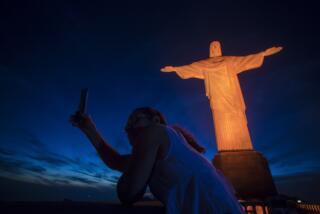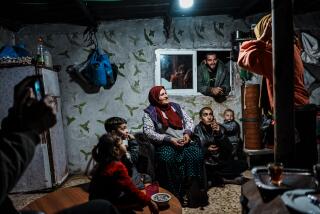Secret Code to a ‘Strong’ Cup of Tea in Brunei
- Share via
World Travel Watch is a monthly report designed to help you make informed judgments about travel throughout the world. Because conditions can change overnight, always make your own inquiries before you leave home. In the United States, contact the nearest Passport Agency office; abroad, check in with the nearest American embassy.
SOUTHEAST ASIA
Brunei: Behavior in Brunei is influenced by Islamic precepts, dictating modest dress for women and discouraging displays of affection by unmarried couples in public. Alcoholic beverages are virtually non-existent except in clubs reserved for foreigners, but sometimes you can get beer in a teapot in Chinese restaurants if you look the waitress in the eye and ask for “strong” tea.
The only real road outside the capital city of Bandar Seri Begawan runs along the coast to Kuala Belait and the Sarawak border, continuing on to Miri. There is a fair amount of traffic to Miri because of its reputation as a cowboy town where Bruneian men can escape Islamic strictures in the bars and “beauty saloons” where they can get more than their hair done.
Most travel into the interior is done by boat, where another kind of traditional life goes on in Iban longhouses near towns such as Bandar. Although more difficult to reach than Kampong Ayer, the longhouses offer the adventurous a rich glimpse of old Borneo.
Cambodia: Despite continuing war and diplomatic isolation, Cambodia is trying to upgrade its tourism facilities. Visas, now obtainable only in Vietnam, Laos or the Soviet Union, could soon be available on arrival.
The Cambodiana Hotel, a project begun in the late 1960s, should be completed by the end of this year and will double the number of rooms available to travelers. Soon it may also be possible to fly to Phnom Penh from Bangkok rather than from Vietnam.
The ancient temple site of Angkor Wat is considered safe although it is near areas where fighting continues. Facilities throughout the country are in poor condition. Exercise caution.
Philippines: Demonstrations have accompanied talks between U.S. and Philippines officials on the fate of the American military bases in the Philippines, but such protests do not affect travel or Filipinos’ regard for Americans.
On a personal level, Filipinos remain warm and welcoming. Recent killings of off-duty American soldiers near the Subic Bay navy base and Clark Air Force Base are a reminder to avoid areas frequented by military personnel in the face of threats by Communist rebels against U.S. officials.
Exercise caution at night in entertainment districts of major cities because of increased crime. Most major tourist sites and urban areas, however, remain free of civil disorders and are safe.
Daily brownouts have plagued Manila in recent weeks because aging generator plants have been under badly needed repair, and drought in Luzon has cut hydroelectric power supplies. The power failures have run as long as eight hours a day.
ASIA
India: Unrest in Kashmir continues unabated, with more saber rattling by Pakistan and India. Pakistan is reportedly massing troops along the border and India has threatened to take countermeasures. The region remains off-limits to foreigners.
Nepal: Jockeying between King Birenda and the new opposition government continues as Nepal tries to find its way to representative government.
The tranquillity and magic of Katmandu may be lost in the process as tightened security forces residents indoors and restricts the movement of foreigners at night. Strolling the dark streets of Katmandu is one of the world’s most fascinating pastimes.
South Korea: Violent student demonstrations against the government continue on a regular basis in Seoul and other cities, although Koreans are showing signs of tiring of them. Most protests are well organized and seldom affect travel. Avoid large groups, especially in urban areas.
Tibet: Martial law was lifted recently in Lhasa, although from a practical standpoint the move will have little affect on travel in the Tibetan capital. A week later the Chinese government imposed new restrictions on travel to Tibet, which require foreigners to apply for permits with the tourism administration of the Tibetan Autonomous Region in Lhasa at least one month ahead. Minimum group size is now two people.
China has also banned demonstrations and public gatherings in Lhasa that lack official permission, keeping open the option to crush popular dissent as it did in March, 1989.
AFRICA
Kenya: A nominal fee paid in advance to tour companies for assistance in getting onto flights and to and from the airport can be a good investment, especially when flying on domestic flights that are often overbooked.
Ivory Coast: Mutinous soldiers protesting for higher pay closed Abidjan’s international airport for a day recently, another indication that economic and political conditions are deteriorating. The crisis was resolved with promises to address their grievances, but such unrest could recur. Use caution.
Liberia: Fighting between rebels and government forces has intensified in the interior, and all travel to Liberia should be deferred until further notice.
MIDDLE EAST
Iraq: Due to continuing tensions with Iran, avoid travel north and east of Mosul, along the Iranian border and to marsh areas north of Basrah. Register with the U.S. Embassy on arrival.
Yemen: West-leaning Yemen and pro-Soviet Southern Yemen have united to form a new republic. The new country is about the size of France, and borders the entrance to the Red Sea at the tip of Saudi Arabia.
Sana, the old capital of Yemen, is the new republic’s capital. Aden, the former capital of Southern Yemen, is the new country’s economic center and main port. The union’s effect on travel is unknown so far.
EUROPE
Albania: A law permitting Albanians to travel abroad after decades of prohibition was passed recently, another step toward liberalization in this isolated, Stalinist country. Travel to Albania could soon be possible, as the country moves toward rejoining the international community.
Czechoslovakia: Visas are no longer required for visits of 30 days or less.
East Germany: A wave of impoverished refugees from other Eastern European countries, primarily Romania and Bulgaria, is putting further stress on already strained facilities and social services in East Berlin.
Hundreds of people sleep in East Berlin’s railway station each night, and tensions are rising between the refugees and East Germans facing unemployment due to the costs of unification.
Poland: Cab drivers in Warsaw commonly try to overcharge foreigners. One dollar should be sufficient to cover a ride about anywhere in town, but rampant inflation makes it hard to know what the fare is in Polish currency. A recent rule of thumb is to multiply the meter reading by 40. Street crime also has increased in Warsaw. Use common sense precautions.
Soviet Union: Crime against foreigners has increased dramatically in the last year because of deteriorating economic conditions and the easing of restrictions limiting contact with residents; theft and robbery are becoming more common. Stay alert and keep an eye on your possessions, especially in urban areas.
For more information on safety concerns in countries you may be visiting, contact the Citizens Emergency Center, U.S. Department of State, Washington, D.C. 20520; telephone (202) 647-5225.
More to Read
Sign up for The Wild
We’ll help you find the best places to hike, bike and run, as well as the perfect silent spots for meditation and yoga.
You may occasionally receive promotional content from the Los Angeles Times.






